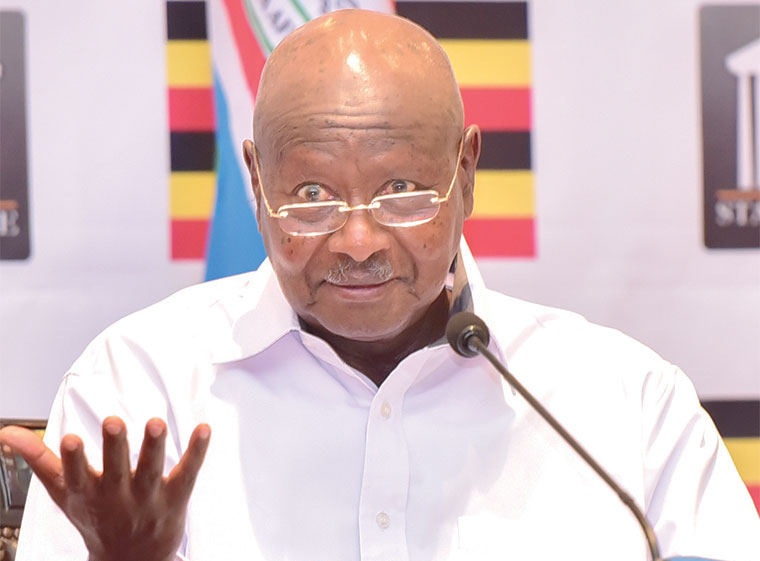President Museveni Defends Wealth Creation Programs as Key to Uganda’s Economic Transformation

President Yoweri Museveni has doubled down on the effectiveness of Uganda’s wealth creation programs, responding to recent criticism about the restructuring of key government agencies.
In a comprehensive message posted on his official X platform, Museveni highlighted initiatives like Operation Wealth Creation (OWC) and the Parish Development Model (PDM) as pillars of Uganda’s socio-economic progress, emphasizing that they have done more to lift households out of poverty than traditional agencies like NAADS (National Agricultural Advisory Services) and UCDA (Uganda Coffee Development Authority).
The President pointed out that these programs have driven more Ugandan households into the money economy, drastically improving economic inclusion across the country.
According to Museveni, the roots of Uganda’s wealth creation programs go back to the early years of the National Resistance Movement (NRM), when the economy was struggling, and public servants earned low wages.
The government initially set up agencies like UCDA and NAADS to stimulate sectors such as coffee and agricultural advisory services. However, he argued that these agencies did not fulfill the NRM’s vision of broad-based economic growth, noting that by 2013, around 68% of Ugandan households were still outside the money economy.
“We had to act,” Museveni said, explaining the rationale behind launching Operation Wealth Creation. “We realized that to transform the economy, we needed a more hands-on approach to get resources directly into the hands of Ugandans.”
Museveni praised Operation Wealth Creation, which was launched in 2013 and entrusted to the military, as a game-changer for Uganda’s agricultural sector.
He highlighted that under OWC, officers distributed millions of coffee seedlings and other planting materials across Uganda, allowing farmers to plant cash crops and diversify their incomes. In Masaka alone, OWC facilitated the planting of over 38,000 acres of coffee.
The President noted that OWC provided additional resources like tea, fruit trees, cassava, and livestock, which enabled more Ugandan households to transition into the cash economy.
“Today, 67% of Ugandan households are part of the money economy, a significant increase,” he stated.
According to Museveni, the program helped accelerate Uganda’s move towards economic inclusion, even as traditional agencies struggled to make an impact.
Despite its success, OWC encountered challenges such as accusations of favoritism, poor-quality supplies, and untimely deliveries. Museveni acknowledged these issues, noting that they were similar to the problems faced by NAADS and UCDA before OWC took the lead in distribution efforts.
He indicated that in response, the government launched the Parish Development Model, a program that places decision-making power directly in the hands of local communities.
Through PDM, funds are allocated at the parish level, allowing communities to purchase their own agricultural inputs and prioritize projects most relevant to their needs. Museveni described PDM as “the first low-interest, mass credit initiative” for Ugandans, enabling them to access capital at affordable rates.
“PDM is showing success in areas where it has been properly implemented,” Museveni said, underscoring the importance of local empowerment. “We are putting power directly into the hands of the people, giving them the opportunity to drive their own development.”
Museveni defended the decision to rationalize government agencies, stating that too many resources were being diverted to ineffective institutions. He rebuffed claims from agencies like NAADS and UCDA that Uganda’s agricultural growth is solely due to their work, labeling such assertions as “fraudulent.”
“We are not going to continue funding institutions that are not delivering results,” he declared. Museveni emphasized that rationalization is meant to consolidate resources, channeling them to programs that have proven effective, like OWC and PDM.
Museveni also called for a focus on value addition, particularly in coffee production, noting that Uganda is exporting 9 million bags annually but still earns only $900 million because much of the coffee is unprocessed. He pointed out that other coffee-producing nations add value locally, a practice that boosts income and retains soil nutrients that are lost when raw coffee is exported.
The President underscored that wealth creation programs are not only about boosting agricultural productivity but also about fostering Uganda’s economic independence. He cited PDM as a path towards sustainable economic empowerment, one that could free Ugandans from dependency on external forces or expensive imports.
“Every time a coffee bean is exported to Hamburg, it takes away valuable nutrients from our soils. We need a fair return on these resources,” he said, criticizing those who oppose rationalization as potentially influenced by foreign interests.
Museveni also shared his vision of an economy where wealth creation extends beyond agriculture, mentioning programs like Emyooga, which provide funding for various skills and businesses beyond farming.
The President’s speech sends a clear message that wealth creation remains central to the NRM’s development agenda. By restructuring inefficient agencies and redirecting resources to hands-on programs like OWC and PDM, Museveni intends to continue empowering Ugandans to lift themselves out of poverty.
As the Parish Development Model and other wealth creation programs progress, the government will continue to monitor their implementation, address challenges, and seek improvements.
Ugandans can expect to see further government intervention to support wealth creation efforts in the coming months, as Museveni champions a vision for a self-sustained, prosperous Uganda where more citizens participate in the cash economy and contribute to the nation’s growth.


Comments are closed.